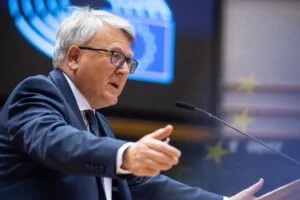Brussels – The political groups in the European Parliament have chosen to revive the figure of the Spitzenkandidat, but realistic ambitions for the June 6-9 post-election remain unknown. Not least because—faced with a group like the Greens/Ale proposing four candidates (two of which will be left for the campaign)—the Party of European Socialism (PES) seems to be running out of choices when there is only one day left before the deadline to submit nominations for the Rome Congress where a decision will have to be made. To date, the only candidate is Nicolas Schmit, a longtime Luxembourg politician and current European Commissioner for Jobs and Social Rights.

Spitzenkandidat—German for “leading candidate”—in European jargon denotes that political figure that each European party indicates to voters as their first choice for the presidency of the European Commission should they win the EU Parliament elections. According to the PES rules, each candidate or nominee needs the support of at least nine parties or full-member organizations (i.e., 25 per cent of the total), with one nominating him or her and eight others endorsing him or her. If more than one nomination results, a ballot is organized at the PES Electoral Congress, where it is necessary to secure more than 50 per cent of the votes of all full members. However, just hours before the January 17 deadline to submit nominations, only Commissioner Schmit’s name appears on the PES list.
Schmit is reportedly supported by two of the largest national parties in the European political family of socialists, the Socialist Workers Party of Spain and the Social Democratic Party of Germany (the latter made this explicitly known in a statement by its secretary general, Kevin Kühnert). For the time being, the Italian Democratic Party is not making any pronouncements on direct support for Schmit—on the understanding that in the absence of challengers the current European commissioner will be the official Spitzenkandidat—but the party’s head of delegation to the European Parliament, Brando Benifei, expresses, “on a personal note” to Eunews, “appreciation for Schmit’s work.” The option is also seen “favourably” because of his portfolio of expertise in the von der Leyen cabinet: “He would adequately represent the commitment to a social Europe.” However, the PD’s head of delegation to the EU Parliament wanted to clarify that “this decision will be taken as a whole political force and therefore in the appropriate fora” (the PES Congress in Rome on March 2). While the intentions of Ursula von der Leyen in the race for a second term as president of the EU Commission (which would imply the approval as Spitzenkandidat by the European People’s Party) are still unclear, the European Socialists have the presidency of the European Council in their sights, a race made more hectic after the Jan. 6 step back by the institution’s current number one, Charles Michel.
The frole of the Spitzenkandidat
The figure of the Spitzenkandidat was first introduced for the 2014 European elections, in the wake of the increased powers that the EU Parliament was given by the Lisbon Treaty—signed in 2007 and entered into force in 2009—and which MEPs wanted to interpret as broadly as possible.
The parties also wanted to try to reconcile with voters, who had always viewed the Commission as a body distant from citizens’ lives but with broad powers to influence them. Naming a person means making sure that voters can get to know him or her before he or she takes up an important post, and at the same time, it is also a chance for the parties to implicitly suggest who they would like to prevent—even internally—from being chosen after the elections.
Because it is not the parties that formally designate the president of the commission, nor is the European Parliament. Under the Lisbon Treaty, this power rests with the governments, meeting in the European Council, who choose the person who is to lead the Commission. The name is proposed to the European Parliament, which, in each case, has the power to approve the choice or not. In essence, it is a shared power, between an institution that chooses and an institution that approves. That is why the possible short circuit between the council and parliament can be solved by the introduction of the Spitzenkandidat, but only on the strictly political level, because the indication by the parties before the elections has no legal value. Added to this is the fact that no group in the European Parliament—under current conditions and likely even post-election in June—has the strength to choose the president of the commission on its own, which is therefore the result of an agreement between different political forces and with national governments.
English version by the Translation Service of Withub






